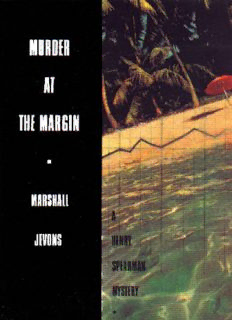
Murder at the Margin (A Henry Spearman Mystery) PDF
Preview Murder at the Margin (A Henry Spearman Mystery)
Murder at the Margin Murder at the Margin is fiction, and all the characters and adventures are imaginary. Any resemblancetoactualpersons,livingordead,is purelycoincidental. Murder at the Margin M A R S H A L L J E V O N S A Henry Spearman Mystery P R I N C E T O N U N I V E R S I T Y P R E S S P R I N C E T O N , N E W J E R S E Y PUBLISHEDBYPRINCETONUNIVERSITYPRESS,41WILLIAMSTREET PRINCETON,NEWJERSEY 08540 INTHEUNITEDKINGDOM:PRINCETONUNIVERSITYPRESS, CHICHESTER,WESTSUSSEX COPYRIGHT1978BYWILLIAMBREITANDKENNETHELZINGA; NEWAFTERWORDCOPYRIGHT1993 BYWILLIAMBREITANDKENNETHELZINGA NEWFOREWORD1993BYPRINCETONUNIVERSITYPRESS ALLRIGHTSRESERVED LIBRARYOFCONGRESSCATALOGING-IN-PUBLICATIONDATA JEVONS,MARSHALL. MURDERATTHEMARGIN:AHENRYSPEARMANMYSTERY/ MARSHALLJEVONS P. CM. ISBN0-691-03391-9—ISBN0-691-00098-0(PBK.) 1. ECONOMISTS—UNITEDSTATES—FICTION. I. TITLE. PS3560.E88M87 1993 813′.—DC20 93-19771 FIRSTPRINCETONPAPERBACKPRINTING,1993 PRINCETONUNIVERSITYPRESSBOOKSAREPRINTEDON ACID-FREEPAPERANDMEETTHEGUIDELINESFORPERMANENCEAND DURABILITYOFTHECOMMITTEEONPRODUCTIONGUIDELINESFORBOOK LONGEVITYOFTHECOUNCILONLIBRARYRESOURCES 1 3 5 7 9 10 8 6 4 2 PRINTEDINTHEUNITEDSTATESOFAMERICA Ilearnagooddealbymerelyobservingyou, Andlettingyoutalkaslongasyouplease, Andtakingnoteofwhatyoudonotsay. T.S.Eliot TheCocktailParty This page intentionally left blank FOREWORD Murder at the Margin EVERY GREAT DETECTIVE has his or her milieu. For Sher- lockHolmesitisthedingystreetsandstatelymansionsof Edwardian England. ForMissMarpleitisaBritishcoun- try village. For Inspector Maigret it is the boulevards of Paris. Such detectives know not only the geography of theseplaces,theyknowtheinstitutionsandthepeopleas well. They understand how things work in their milieu and how people behave there. Henry Spearman, the detective-heroof Murder at the Margin,hasadifferentkindofmilieu,onenotconfinedto anyparticulartimeorspace.Hismilieuisinsidethehead oftherationalmanorwoman,thepersonwho,ifgivena choice between two ways of achieving a given objective, always chooses the way that costs less. By understanding how suchapersonwouldbehave,andontheassumption that all the persons involved are rational in that sense, Spearman solves the mystery. Our detective is an economist. He is a student of ra- tional, goal-maximizing behavior. He also thinks, talks, and acts like a person for whom rationality is constantly foremost in his mind. Moreover, the author, Marshall Jevons,isalsoaneconomist.WhenHenrySpearmanne- glects to explain adequately the economic analysis that underlies his thinking, the author does it for him. Spearman,andtheauthor,bringtobearinthecourse viii Murder of solving their mystery a number of economic concepts thatarevariationson thethemeofrationality.Thereare discussions of the way a rational person thinks about the choice between income-earning work and leisure, about how to set the optimum price for selling a book, about why some people have the relationships to others that they do, about how quantities of products supplied and sold are kept equal, about the impossibility of comparing the utilities of different individuals, and so on. But this is all incidental to the fact that there have beenmurdersandwedon’tknowwhodoneit.Spearman discovers who done it by rigorous application of a very simple economic proposition, coupled with acute obser- vation.Theessenceoftheplotisthatthereisamystery— someoneisbehavinginawaythatisnottransparent,but wedonotknowwhoitis.WhenSpearmanseessomeone behaving in a way that seems to be irrational, not the apparent least-cost way of achieving his apparent objec- tive, he knows that there is a mysteryabout that person. Thatpersonhassomeobjectiveorsomecoststhatarenot apparent. And if Spearman has sufficientobservationsof apparently irrational behavior he can deduce what the person is up to. WithoutgivingawaythedenouementofMurderatthe Margin I can provide a simple, if absurd, illustration that is not in the book. Suppose you see that in your hotel dining room at breakfast a person has a choice between two apparently identical doughnuts, one for fifty cents andoneforadollar.Hechoosestheoneforadollar.You then deduce that the two doughnuts are not identical to him. Butsupposeyouobservethathehadalsoboughtup all the copies of the morning newspaper in the hotel at the Margin ix where you both are staying, although a rational person would have been satisfied with one, and you know that the paperhad afront-pagestoryabout the disappearance of aruby from the forehead of an Indian idol. You might then deduce that the dollar doughnut contained the Indian ruby. Murder at the Margin has been used as supplementary reading in many introductory courses in economics. It serves to get the beginning student curious about eco- nomic concepts and provides a hook upon which an in- structor can hang a more formal lecture. Professional economists will get pleasure from seeing familiar princi- ples used in unfamiliar circumstances. People who know little about economics will learn something of what eco- nomics and economists are like. But Murder at the Margin is not an economics text- book and one would no more read it to learn economics thanonewouldreadConanDoyletolearnthechemistry ofcigarashesorAgathaChristietolearntoxicology.The economics is the shtick and not the shtory. The story is a good classical detective story with all thenecessaryingredientswelldeveloped.Therearemur- der victims to whom we have no particular attachment. Our interest in the puzzle of who killed them is not al- loyedbyanysadnessattheirpassing.Thereareanumber ofplausiblesuspects.Therearethenecessarycluesforthe solution, hidden in a haystack of circumstanceand inci- dent. A sufficiently assiduous, attentive, logical reader mightdiscoverthesolutionbeforeitisrevealed,butsuch areaderwouldbeexceedinglyrare.Whenthehighly ob- servant, analytical, and courageous detective reveals the culprit, the reader acknowledges that he has been fairly
Description: